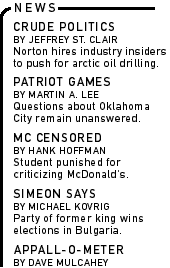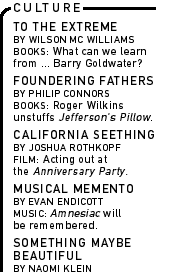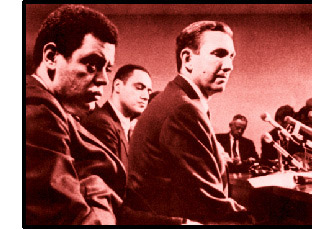

|

|

|

|
|
|
| |
|
|
|
Jefferson's Pillow: The Founding Fathers
In the preface to the recently published Trading Twelves: The Selected Letters of Ralph Ellison and Albert Murray, Murray writes, in the cadence of a patriotic preacher:
Ellison and I regarded ourselves as being the heirs and continuators of the most indigenous mythic prefiguration of the most fundamental existential assumption underlying the human proposition as stated in the Declaration of Independence, which led to the social contract known as the Constitution and as specified by the Emancipation Proclamation and encapsulated in the Gettysburg Address and further particularized in the Thirteenth, Fourteenth and Fifteenth Amendments. Murray and Ellison, in other words, found their American Dream not in men but in the expression of their ideals, which outlived and transcended the founders themselves. Nevertheless, this position entailed both defiance of, and some form of reconciliation with, the horrific violence at the heart of the American project. Here we can see the culmination of W.E.B. Du Bois' theory of doubleness in men who took the project of integrating their dual selves--Negro and American, as Du Bois had it--to be the most profound work of a lifetime. In Jefferson's Pillow: The Founding Fathers and the Dilemma of Black Patriotism,
Wilkins has spent his lifetime in the public realm. He served as assistant attorney general during LBJ's presidency, won a Pulitzer Prize at the Washington Post for his coverage of Watergate, and has worked across several decades for the cause of civil rights. He feels himself to be an American deep in the marrow of his bones, and he wants to claim what he can of the legacy of the founders while recognizing that, had he been their contemporary, the only claim would have occurred in the other direction, as master over slave. Wilkins' inquiry focuses specifically on the aspirations and accomplishments of four men: James Madison, George Mason, George Washington and Thomas Jefferson. They owned, among them, more than 400 human beings sold or born into slavery. Yet their intellectual, political and (in the case of Washington) military labors created democratic instruments later used to extend the basic rights of citizenship to all Americans. The schoolhouse narrative of American history posits slave ownership as a blemish on the otherwise illustrious careers of the founders: We are perhaps to admire their legitimate achievements even more for having occurred coincidentally with their moral failures on the question of race. In this view, slavery was a kind of curse imposed on otherwise noble men by previous generations, a failing not so much of individual consciences as it was of the culture at large. Wilkins acknowledges culture's role in shaping these men, but he also offers an alternative narrative whereby slave ownership proved essential to the founders' radical political project. Privileged members of the Virginia landed gentry, all four of the men he studies derived wealth and independence from their status as slave owners. Released from the rigors of physical labor themselves, they were free to travel, read, write, philosophize, stand as representatives in various embryonic bodies of democratic governance, and worry over the fate of their properties and their political freedoms. Slave labor, in other words, quite literally enabled the founders the time and energy to pursue the project of constitutional democracy. In this reckoning, the slaves at Monticello and Mount Vernon were, in their own fashion, indispensable partners in the political birth of the nation--without them, Wilkins argues, the founders would have been "less learned, less strategically astute, and less politically wise." Wilkins pokes around various paradoxes, juxtaposing the words and actions of the founders in ways that reveal them in all their maddening contradictions. Mason, in particular, seemed to understand the evil of what he called "the infernal trade." He wrote with the moral clarity of a man seeking betterment through self-castigation: "Every master of slaves is born a petty tyrant. They bring the judgment of heaven on a country. As nations can not be rewarded or punished in the next world they must in this." In a stroke of eerie prescience, he concluded, "By an inevitable chain of causes and effects, providence punishes national sins, by national calamities." In fact, the founders worried a great deal over slavery--but they tended to do so only in the context of nation-building. Their lives were too entwined with the institution to allow them personally to renounce it. Yet their intimacy with its horrors fed their fears that they, too, might be ensnared in some form of bondage by their colonial masters across the ocean. Plagued by a nagging inferiority complex in relation to their aristocratic British counterparts, they clung to slavery as an emblem of their power and privilege even as they rued the consequences for democracy. Washington eventually freed his slaves--but only upon his death. None of Wilkins' subjects embodied the contradictions between deeds and professed ideals more thoroughly than Jefferson. "He was a dizzying mixture of searing brilliance and infuriating self-indulgence, of idealism and base racism, of soaring patriotism and myopic self-involvement," Wilkins writes. "He was America writ small." Recent DNA evidence, of course, indicates that Jefferson fathered four children with one of his slaves, Sally Hemings, even as he railed in his writings against the evils of miscegenation. The hypocrisy boggles the mind. Whatever affection may have existed between them, if there was any at all, the relationship occurred in the context of a man and his property. Hemings was denied all of the freedoms for which Jefferson argued so passionately in the public realm. Wilkins, by complicating our idea of these secular saints, implicitly makes a powerful argument in favor of the progressive impulse. Near the end, he writes:
When I think of my relative wealth as compared to poor people in my own country and in the developing world, and how little help I offer, I wonder how I would survive history's most intense scrutiny. I wonder the same things as I hum along alone in my powerful European sedan, commuting between work and home on a route just parallel to a public transportation system. ... Consuming comfortably while millions of malnourished and therefore doomed children across the globe suffer in poverty, or helping to make the planet uninhabitable--how do these things stack up against slavery? I can't be sure, but I do know that though these are among the greatest moral challenges of my time, I am addicted, like the founding fathers, to my privileges and their convenience. We are obliged to judge because we are obliged to do better; to
probe the flaws of our predecessors is to engage not in vindictive
finger-pointing but to resist hubris and complacency in our own
time. Wilkins' book has made a mirror of the past in which we glimpse
our own shortcomings--and perhaps even the means for transcending
them. Philip Connors is an editor on the Wall Street Journal's Leisure & Arts page.
|


